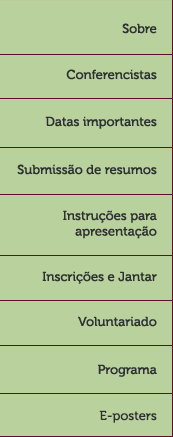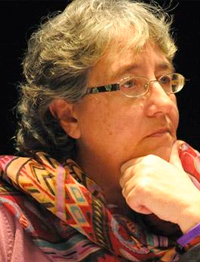
Conferencistas
Liz Kelly

A Professora Doutora Liz Kelly é formada em Sociologia (PhD) e em Sociologia e Políticas (BA). É professora na área da violência sexualiza na London Metropolitan University, onde é diretora da Child and Woman Abuse Studies Unit (CWASU). Tem trabalhado as questões ligadas à violência contra as mulheres e violência contra crianças, tendo sido autora da reconhecida obra Surving Sexual Violence e de mais de 100 artigos em livros, capítulos e artigos de revistas científicas.
Título: The continuum of sexual violence: its overlaps and differences with domestic violence
Both international and national policy frameworks and research agendas have, for two decades, focused on domestic violence, leaving sexual violence on the margins. In this paper I explore the continuum of sexual violence – rape, sexual assault, sexual harassment and sexual exploitation across childhood and adulthood. Whilst some takes places within the domestic context much does not. There are multiple connections, overlaps and differences all of which need to be considered if we are to develop holistic responsiveness to the needs of women and girls and effective prevention.
Marianne Hester

A Professora Marianne Hester é uma reconhecida investigadora na área da violência de género e as suas principais áreas de interesse são a violência doméstica, o casamento forçado e os crimes de honra, mas também o sistema de justiça criminal e respostas formais do sistema à violência. É editora responsável do Journal of Gender-Based Violence e responsável pela unidade curricular de Género, Violência e Políticas Internacionais na Universidade de Bristol.
Título: (What) about the men?
While women have vigorously resisted the label of 'victims', we are increasingly seeing men taking on this mantle. For instance, Donald Trump positions himself as a victim of 'fake media'; and other men see themselves as the victims of domestic abuse by women and are reporting such abuse in ever greater numbers to the police. The talk asks questions about this supposed 'victim status' of men with regard to domestic violence. Can men's experiences in intimate relationships be characterised as coercive controlling violence? and may this differ for men in heterosexual and same sex relationships? To get at the issues the paper uses results from a number of recent studies: findings from a large sample of heterosexual male patients in primary care in England, that measured a range and impacts of potentially domestic violence behaviours (Hester et al, 2017); national research on gay men's experience and use of domestic violence (Hester et al, 2010), and work on 'who does what to whom' (Hester, 2013).
Carolina Øverlien

A Professora Carolina Øverlien leciona na Universidade de Estocolmo e é especialista na área das crianças e jovens vítimas de violência doméstica. Esta professora foca-se não só nas suas experiências de vitimação, como também nas estratégias de coping que as crianças e jovens adotam para lidar e ultrapassar a situação de violência. Juntamente com outros/as investigadores/as nórdicos, a Professora Carolina foi responsável por algumas alterações políticas neste âmbito. Pertence também ao Norwegian Center for Violence and Traumatic Stress Studies, sendo responsável pela unidade de violência e trauma - crianças e jovens.
Título: Research on children experiencing domestic violence - trajectories, methodological shifts, and challenges going forward
Marceline Naudi

Marceline Naudi é doutorada em trabalho social, com especialidade em estudos sobre as mulheres. Atualmente leciona na Universidade de Malta, é responsável pelo departamento dos Estudos de Género e é a representante nacional no Council of Europe ad Hoc Committee on Violence against Women and Domestic Violence (CHAVIO), responsável pela implementação da Convenção de Istambul. As suas principais áreas de interesse são a violência contra as mulheres, as questões de género, LGBT e racismo.
Título: Monitoring the implementation of the Istanbul Convention
The Convention on preventing and combating violence against women and domestic violence (known as the Istanbul Convention) was adopted by the Council of Europe Committee of Ministers on 7 April 2011, and entered into force on 1 August 2014. Monitoring of the implementation of the convention by the States party to it is carried out by an independent expert body, known as the GREVIO, the 1st ten members of which were elected in May 2015. GREVIO had its 1st meeting in September 2015, and adopted a questionnaire to be used as a monitoring tool in March 2016. Country evaluations started soon after. There are currently 8 countries in different stages of evaluation. The procedures and practice of monitoring and evaluations will be discussed, also considering the challenges faced in the process.
María Lameiras Fernández

Professora na Universidade de Vigo, no departamento de Análise Psicoeducational, a Professora Maria Lameiras é doutorada em Psicologia (Universidade de Santiago de Compostela) na especialidade de Psicologia da Sexualidade. Tendo mais de 50 artigos publicados, é investigadora em vários projetos nacionais e internacionais com experiência de mais de 15 anos de docência em diversas universidades espanholas e estrangeiras (nomeadamente no Brasil, Peru, Colômbia, México, Estados Unidos, entre outros). As suas áreas de interesse centram-se na sexualidade dos/as adolescentes, educação sexual, abuso sexual a menores, tratamento de agressores sexuais nas prisões e o sexismo moderno.
Título: Gender Violence and Femicide in South of Europe: the situation in Spain, Italy and Portugal
It is the aim of this talk to explore the situation of gender violence in Europe, specifically the incidence of femicide committed by partners or ex-partners in Spain, Italy and Portugal. Available data inform us of the high prevalence of femicide in Portugal, with twice as many cases as in Spain and Italy. It is noted that the majority of the victims of violence in the three countries were murdered by their intimate partners, as opposed to by their ex-partners. We conclude that the development of appropriate services positively influences the occurrence of femicide in Southern European countries, so that rates of femicide are lower in countries where policy development and data collection are comparatively more consistent over time. Finally, the study highlights the reasons why femicide data is relevant, and what special contribution it can bring to understanding the more general phenomenon of violence against women and gender-based violence.
Marsha Scott

A Doutora Marsha Scott é uma ativista, profissional e investigadora feminista e tem trabalhado no sector da violência contra as mulheres no Reino Unido, nos Estados Unidos da América e na Europa durante 30 anos. Antes de ocupar a posição como Diretora Executiva da associação Scottish Women’s Aid em Abril de 2015, trabalhou durante 10 anos no Conselho de West Lothian, onde ajudou a construir e teve responsabilidade estratégica sob a West Lothian Domestic and Sexual Assault Team.
Título: Designing services that challenge coercive control, or, "Aye, it's the patriarchy, sister"
Summary: While (some) countries across Europe are working to embed the new coercive control paradigm into their criminal and civil laws (e.g., http://www.parliament.scot/parliamentarybusiness/Bills/103883.aspx), national and local support organisations can use the stories of women to examine our own paradigms about support and resistance. Dr. Scott will explore the concept of space for action as a frame for designing services that challenge the everyday oppressions and constraints of patriarchal socioeconomic structures.
Walter DeKeseredy

Walter S. DeKeseredy é Professor Catedrático de Ciências Sociais, Diretor do Centro de Investigação sobre Violência, e Professor de Sociologia na West Virginia University. Publicou 22 livros, 89 artigos científicos e 76 capítulos de livros sobre violência contra as mulheres e outros problemas sociais. Em 2008, o Instituto de Violência, Abuso e Trauma presenteou-o com o prémio Linda Saltzman Memorial Intimate Partner Violence Researcher Award. Também recebeu o prémio Distinguished Scholar Award em 2004 da Divisão de Mulheres e Crime da Sociedade Americana de Criminologia, e o prémio inaugural UOIT Research Excellence Award em 2007. Em 1995, recebeu o prémio de Critical Criminologist of the Year da Divisão de Criminologia Crítica da Associação Americana de Criminologia, e em 2008 a mesma Divisão galardoou-o com o prémio Lifetime Achievement Award. Em 2004, recebeu o prémio Critical Criminal Justice Scholar Award da Secção de Justiça Criminal Crítica da Academia de Ciências da Justiça Criminal, e em 2015 foi presenteado com o prémio Career Achievement Award da Divisão de Vitimologia da Associação Americana de Criminologia. Em 2017, recebeu o prémio Impact Award da Secção de Vitimologia da Academia de Ciências da Justiça Criminal.
Título: Violence Against Women in Rural America
Summary: We now have strong statistical evidence showing that rural women in the United States are at greater risk of being victimized by various types of male violence than are their suburban and urban counterparts. The main objective of this keynote address is is twofold: (1) to briefly review the sociological empirical and theoretical work on rural woman abuse in America and (2) to identify new ways of understanding violence against rural women.

© Faculdade de Psicologia e de Ciências da Educação da Universidade do Porto - Portugal
